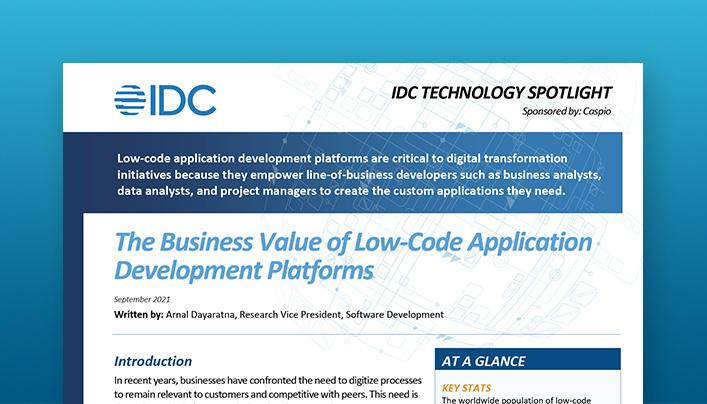Smarter Health Services for Improved Patient Care
NO CODE 2018: Caspio for Health Services
I’ve made a point a few times in private conversations this week, so I might as well declare it in public. This process would not have been possible without the Caspio support team.
You’ve made me feel validated, you’ve walked me through any kind of roadblocks that I’ve experienced, and you’ve celebrated my company’s success.
It is an honor to be here talking to you and just sharing our experience. And it’s a phenomenal partnership.
Paragon: Health Concierge for Clinical Trials
My name is Danielle Baxter and I work with Paragon Global CRS. CRS simply stands for clinical research support.
We started working in clinical research support space roughly 20 years ago, but we were mainly organizing investigator meetings.
So, what we did was we flew physicians around the world so that they could meet with pharmaceutical companies and plan clinical trials. About eight years ago, we pivoted to supporting patients in clinical trials because we recognized a problem.
We would bring physicians from around the world together in places like Bora Bora and the atmosphere was obviously nice. The excitement was incredibly palpable, but once we left, we would retreat and the wind would die. And clinical trials are incredibly complicated, regulated, and they often fail.
They often fail because they cannot retain enough patients. Eighty percent of clinical trials, phase three clinical trials fail to retain enough patients. That means 30% of the patients involved in a clinical trial drop out.
From another perspective, I want you to think about this in dollars. Two billion dollars a year is spent on patient recruitment. So, at an average of $22,000 a patient just to sign somebody up for a clinical trial. And over the life of a clinical trial, that is $40,000 a patient that pharmaceutical companies are investing in developing new drugs and bringing them to market.
Let’s think about this in yet another way. It’s a lot of money, but it’s also a lot of data. So, when a patient drops out of a clinical trial, we also lose their data, which can compromise the integrity and success of a study.
Put simply, that means a longer pipeline for new drugs and more expensive new drugs. That’s a problem.
Growing Pains in a Highly Regulated Industry
We set out to address this problem by increasing patient engagement and eliminating the communication failures that led to these high dropout rates. There are many reasons why patients drop out of clinical trials, most of which have to do with financial burdens and logistical challenges.
How in the world am I going to be able to cover the cost of getting to a doctor’s appointment when I live in New York City and he’s in California? That’s a big challenge.
But it’s one that can be met, and it’s one that can be met because pharma is big business and patients are seen as investments. Right? So, why are we losing patients? Why are we losing this many every year?
We work in a vertically integrated, globally disbursed system. It is incredibly tall and incredibly wide. We work with sponsors, so Johnson & Johnson, Pfizer, Eli Lilly, those kinds of companies. They hire out CROs, which are contract research organizations. These are the people who develop the studies, design the programs, and figure out how patients are going to become enrolled in clinical trials. These are your Syneos, IQVIA, PPD, which is also in Wilmington, North Carolina along with us. We’re a lot smaller though. And then they hire and find clinical sites.
Under those clinical sites, you’ll find coordinators and you’ll also find investigators, which are the physicians. So, and then there are patients. Right? There are patients that are underneath this entirely big stacked business who, for completely understandable reasons, cannot tell one from the other. Who are they supposed to ask for support? It’s a big problem.
Our goal is to mediate these vast networks and eliminate communication failures. But our challenge is that opening up communication networks is counterintuitive in a highly regulated system that prioritizes information security and privacy.
Our first question when we’re approaching this problem is, can we solve it? Is this a place, a space within this industry where we can make a concerted and definitive impact? That’s a question. So, our second question is, okay, well, if we decide that yes, we can, how in the world are we going to do that? How are we going to turn that into a successful business model?
So, let me give you an idea of how we started doing this. Fax machines. Now, as old as they are, they’re still a secure way of sharing sensitive data.
Here’s an idea of what our business process looked like before we adopted Caspio. One. We received a scheduling grid. This is something that a patient or a doctor has to fill out every single time a patient has an appointment in a clinical trial. This allows us to receive information on where they’re going, what services they need, and then we send this back to the site listing all the services that we’ve scheduled. Fax machines that then we have to translate into Excel spreadsheets so that we can track the kinds of the interactions that we’re having with sites and with the patients.
So, once we book the travel, we used to email that information to the patient, email that information to the site, field a lot of questions, especially when patients would lose their booking email, constantly having to send them back new information, constantly having to do that with the sites as well. And any time a patient incurred unexpected expenses, we went right back to fax machines, as in, “Fax me your expense form.” And we did the whole process again where we put this information into an Excel spreadsheet, we sent them an email once it was processed, we sent the site an email once it was processed. Right?
Data entry was basically killing our productivity.
From Fax Machines to HIPAA-Compliant Online Databases
We had known for some time that we needed a better solution, but we we’re kind of an uncommon business. We’re a clinical trials travel agency. It’s a little bit unique.
When we began looking for a digital solution, we brought in an IT consultant who suggested that we adopt CRM software because it was HIPAA-compliant. I’m trying to think of an analogy here. So, that’s like taking a group of vegans to an origin time steakhouse for the bread. Right? It’s just, it’s not gonna work.
We were then faced with another question. How do we take advantage of digital tools to streamline our operations because we knew we needed them when there aren’t really any off-the-shelf options for us.
We just simply do not have the resources, but we decided to do it anyways because we knew we needed a digital solution. So, we hired an IT professional to build us custom software and he ran away with $40,000 of our own money. This is a true story.
So, a bit about my background, I know I should have probably done this before. But I studied rhetoric and law. Simply put, when you say syntax, I do not think JavaScript. The fact that I’m up here addressing a group of people that includes IT professionals speaks volumes about the power of Caspio, who we found through a Google search.
This is where really the magic began, and magic is a word that I’ve heard said over and over again since I’ve been at this conference because that’s really what it feels like.
From the first moment we reached out to Caspio, their sales and support team recognized exactly what we were trying to do, and they validated that. They validated what we were trying to do and that was one of the main reasons why we decided to go with a solution like Caspio. Not with like Caspio, with Caspio.
So, we set an aggressive timetable of four months to roll out our software application, and we achieved that goal. We achieved it. It’s very rare.
We developed four unique portals. One for patients, one for sites, one for clinical sites to help request, confirm services, request and track reimbursements. We also created a blinded sponsor portal to help with financial audits without compromising patient data.
We also developed our administrative portal. It’s based on a calendar view because clinical trials happen over time and patient experience is organized around visits. It’s important to us that our tool organized data according to the patient experience because that’s precisely what we’re trying to manage, patient experience.
We also built within the calendar itself links to other data pages using really simple HTML code. For instance, you can click on a reimbursement icon within a particular visit and you only have to enter three pieces of data, the date of the receipt, the type of the receipt, and the amount of the receipt. The system automatically associates that with a visit number, site number, patient, study, etc. All of that information rapidly cut down on our data entry time.
Continued Focus on Improving Patient Outcomes
We were also able to open our database to external users with role-based access and record-level security, meaning that not only was data entry easier, but it was also outsourced. This entering information into spreadsheets is gone for us.
It allowed our team to focus on customer service, to focus on the high touch interactions through automation. We can devote more time to patient support and realize our goal of better communication.
We’re a small business. We have 15 employees who support clinical trials globally. We are only open for nine hours a day on the East coast, but our patients need services 24/7.
We’ve used Caspio to expand our ability to interact with our patients when we’re closed. Automatic white label notifications and custom workflows means that we can provide clear and consistent communication all the time.
Say a patient needs to go to a visit and he submits a reimbursement request to our system, we automatically receive a notification directly to our bookkeeper who’s prompted to work through an approval process. And the patient can monitor the progress of that request on their portal, whether it’s on a desktop or also on mobile. But it’s simple and it all happens behind the scenes.
We’ve also been able to reduce reporting times for audit purposes from two weeks to seconds. That is astronomical.
Because what it does is it frees up our time to focus on customer service, alleviating burdens, and keeping patients enrolled in clinical trials. It allows us to focus on creating better business value for our customers.
We’ve also been able to develop mobile-friendly options for patient access. We rolled out our mobile-friendly access in under two weeks. And it feels different from our desktop version because people interact on mobile devices differently.
So, we have bigger buttons, we have a scrolling calendar, we have different workflows that decrease the chance that a patient will get lost in navigating the system on their phone. There’s always a home button, for instance, and we were able to do this in two weeks.
Investing in a Strategic Partnership
The more I learn about Caspio, the more I use this system, the more we’re able to solve business problems and enhance our commitments as a company.
We work in an industry that’s incredibly regulated and audited frequently. If we’re capable of supporting them in this way, then we help make them more successful as well.
Before Caspio, it took our financial team two weeks to compile audit reports. Now, it only takes a sponsor logging into the system from weeks down to seconds.
What that means is that we can prioritize a culture of care within our organization. Data is important, but patients come first. That’s our business model. We can realize that commitment now in ways that we’ve never been able to do in the past.
When I started this journey 18 months ago, I would never have imagined that Caspio would transform our company in the way that it has. I would never have imagined how it would have transformed me, but it has and in so many positive ways.
I would never have imagined that a hurricane would take out our fax machines or that one month after the storm, we would still be homeless. We still are homeless. But given all that, I also never would have imagined that I could stand before you today and say that we experienced zero downtime.
I’m gonna say that one more time. Zero downtime, because it’s probably the most significant statistic that I’m gonna stand up here and share with you today about how Caspio has allowed us to be successful.
I’ve heard people talking throughout this conference about the sense of job security that has accrued to them since they’ve adopted Caspio. And I wanna expand on that idea. So, do I have a job because of Caspio? I do. Do I have job security because of Caspio? Yup. Yup. That’s definitely true. But there are also 15 other people back in Wilmington, North Carolina who still have jobs because we experienced zero downtime.
We are out of an office and we are still able to fully operate. And that’s phenomenal. And that’s nothing short of resilience.
There’s something that you can say about being indispensable to your company, but when your company is resilient, that’s a blessing that everybody can share. And we have, and we are blessed in that way by Caspio.
Thank you for the opportunity to stay in here today and to talk to you about our experience.
As, you know, the word love has floated around a lot during this conference, and I think that it’s really appropriate. So, thank you.




